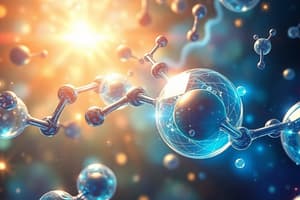Podcast
Questions and Answers
Which element is present in all biochemicals?
Which element is present in all biochemicals?
Why are water and carbon dioxide considered inorganic?
Why are water and carbon dioxide considered inorganic?
What are the building blocks of macromolecules known as?
What are the building blocks of macromolecules known as?
Which organic compound is used as long-term energy storage in animals?
Which organic compound is used as long-term energy storage in animals?
Signup and view all the answers
What is the main difference between saturated and unsaturated fats?
What is the main difference between saturated and unsaturated fats?
Signup and view all the answers
What is the function of enzymes in chemical reactions?
What is the function of enzymes in chemical reactions?
Signup and view all the answers
Which element is NOT found in proteins?
Which element is NOT found in proteins?
Signup and view all the answers
What is the process of combining organic compounds by removing water called?
What is the process of combining organic compounds by removing water called?
Signup and view all the answers
In what part of the body is glycogen primarily found?
In what part of the body is glycogen primarily found?
Signup and view all the answers
What is the main component of cell membranes?
What is the main component of cell membranes?
Signup and view all the answers
What do saturated fats become at room temperature?
What do saturated fats become at room temperature?
Signup and view all the answers
Study Notes
Key Elements and Compounds in Biochemistry
- Carbon is the element present in all biochemicals, forming the basis of organic chemistry.
Inorganic Compounds
- Water and carbon dioxide are classified as inorganic due to the absence of carbon-hydrogen bonds.
Building Blocks of Macromolecules
- Monomers are the building blocks of macromolecules, which combine to form polymers.
Organic Compounds in Energy Storage
- Lipids are the organic compounds used for long-term energy storage in animals, primarily in the form of fat.
Types of Fats
- Saturated fats contain no double bonds between carbon atoms, while unsaturated fats have one or more double bonds, affecting their physical state.
Enzyme Functionality
- Enzymes act as catalysts in chemical reactions, speeding up the process without being consumed.
Elements in Proteins
- Sulfur is the element not found in proteins, as they primarily consist of carbon, hydrogen, nitrogen, and oxygen.
Dehydration Synthesis
- The process of combining organic compounds by removing water is known as dehydration synthesis.
Glycogen Storage
- Glycogen is primarily stored in the liver and muscles, serving as a readily available energy source.
Cell Membrane Composition
- Phospholipids are the main component of cell membranes, allowing for semi-permeability and cellular structure.
Saturated Fats at Room Temperature
- Saturated fats typically remain solid at room temperature due to their straight-chain structure, which allows for close packing.
Studying That Suits You
Use AI to generate personalized quizzes and flashcards to suit your learning preferences.
Related Documents
Description
Test your knowledge of basic biochemistry concepts with this quiz. Explore the fundamental elements and composition of biochemicals, including carbon, hydrogen, oxygen, and nitrogen. Identify the distinction between organic and inorganic compounds, and gain insights into the essential building blocks of life.




